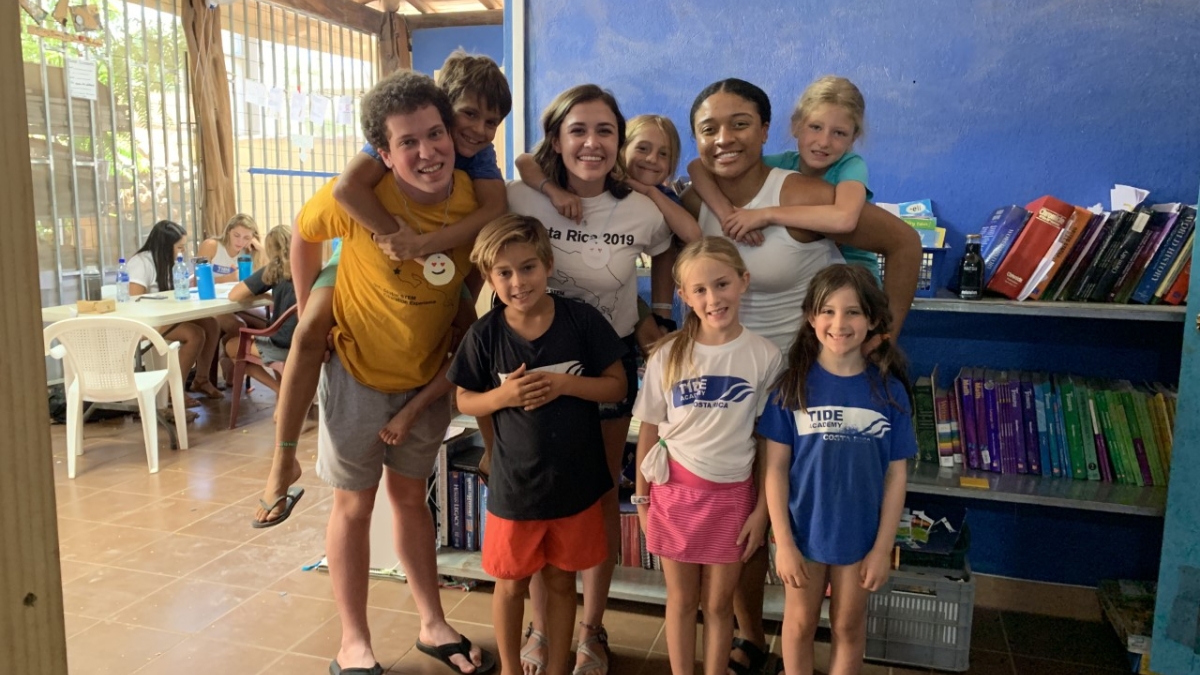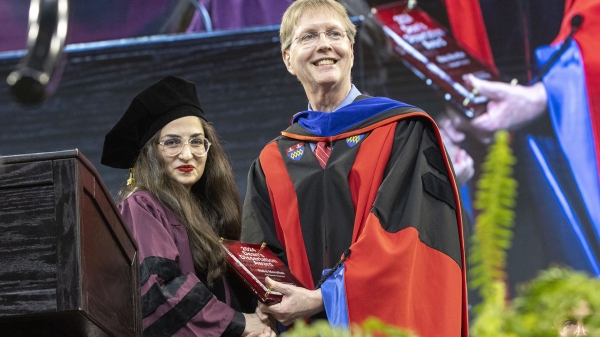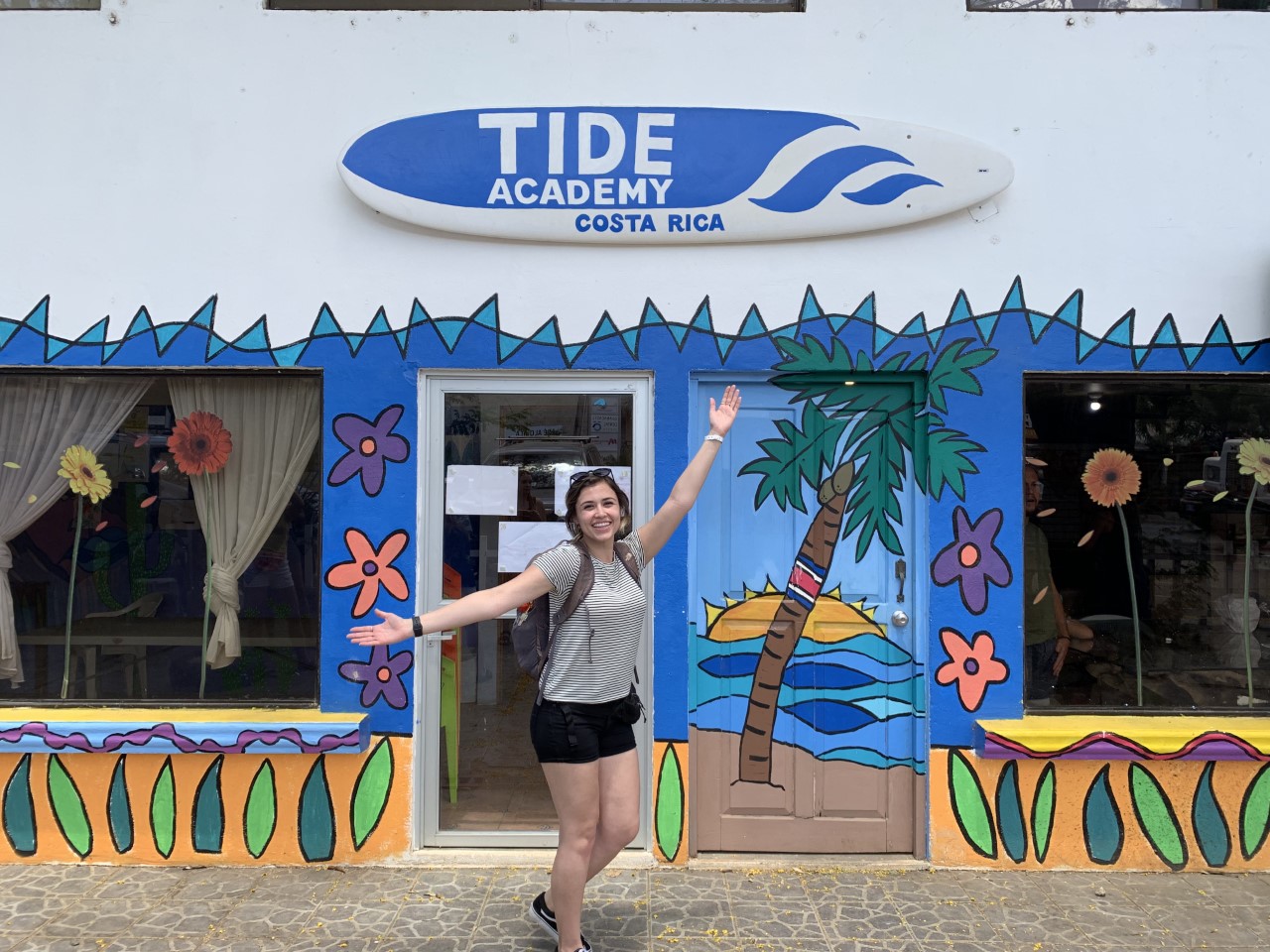ASU anatomy and physiology faculty turn book proceeds into student scholarships

The first SHAPER Scholarship recipients used the funding to help pay for a science-focused ASU Study Abroad experience in Costa Rica. Alyssa Anderson (middle) and Erika McClinton (right) with students at the Tide Academy. Photo courtesy of Alyssa Anderson
When ASU students purchase the lab manual for their human anatomy and physiology courses at ASU’s Downtown Phoenix campus, they're not only preparing themselves for success in the classes, they're contributing to the success of their fellow students.
The customized text, developed in-house by the faculty who teach the BIO 201 and 202 courses, not only costs less than a standard manual, the proceeds directly support ASU students pursuing their passion for science.
Co-authors Jeff Kingsbury, senior lecturer; J. P. Hyatt, associate professor; and Tonya Penkrot, lecturer; in collaboration with then-lab manager Jennifer Legere, were driven in 2017 to create a manual that better served students and was in keeping with the teaching innovations that College of Integrative Sciences and Arts faculty have implemented in science courses.
“We wanted something more relevant, customized and affordable for students. We wanted to develop a product tailored to what we actually do in our labs, that could incorporate the Anatomage Table, and would reduce the cost for students,” explained Kingsbury. “Our manual saves students roughly 50% of what they paid when we used a standard lab manual.”
When the trio ditched the previous lab manual in fall 2017 for their co-authored alternative, they took the benefit to students to an even higher plane, deciding that royalties from the sale of their manual would establish the SHAPER (Scholarship Honoring Anatomy and Physiology Education and Research) Scholarship.
“We all agreed that we wanted to give back to the students,” said Hyatt, about their decision to create the scholarship.
“It’s a good thing to do, and it helps the students,” said Kingsbury. “We worked with our college development officer to start the scholarship with the ASU Foundation. The money goes directly from the publisher to the fund every July and January.”
All three faculty members wanted the scholarship to help students pursue their passions in science in some way.
“We want students to be able to use the scholarship for research, application fees, conference fees or other special educational opportunities in the realm of anatomy and physiology,” said Penkrot.
This includes the study abroad experience that College of Integrative Sciences and Arts faculty direct in Costa Rica. In the program — a partnership between ASU Study Abroad and the Tide Academy, a small school in Costa Rica — students gain exposure to another culture and have the chance to teach and develop science curriculum for K-12 students, helping prepare them to become instructional assistants in anatomy and physiology courses at ASU’s Downtown Phoenix campus.
By December 2018, the SHAPER fund was able to support its first two scholarship recipients.
Rising junior Erika McClinton and graduating senior Alyssa Anderson both used the scholarship to support their participation in the Costa Rica experience in March. For both, the benefits of that experience are still paying dividends.
SHAPER impacts professional paths
For ASU health entrepreneurship and innovation major McClinton, the academic plan had originally been to pursue a bachelor’s degree in nursing. But when she didn’t get accepted into the highly competitive program, she found herself stuck and unsure of what her next move was — until a series of opportunities came her way.
“I found out about the Costa Rica trip through Dr. Kingsbury’s BIO 202 class,” McClinton said. “At first, I told Dr. Kingsbury that I was not able to go, but then he told me about the scholarship opportunity, which was amazing.”
The Costa Rica trip allowed her to combine a few of her passions.
“I wanted to go on the Costa Rica trip because of my love for science. My minor is in Spanish, and I had not been to another Spanish-speaking country since I was 9, so this whole experience was all I had ever dreamed of,” she said. “Also, I knew that we would be teaching children at a school, which really captured my attention, because I had just applied to be an instructional assistant for BIO 201, so everything was lining up perfectly.”
Receiving the scholarship helped change McClinton’s outlook and provided her with new opportunities.
“Getting the scholarship and going to Costa Rica helped me build relationships with the College of Integrative Sciences and Arts faculty, and they encouraged me and gave me the confidence to pursue a summer internship with Anatomage,” McClinton said.
Anatomage, the Silicon Valley-based technology company that created the Anatomage Table that students use for digital dissections in the BIO 201 and 202 courses at the ASU Downtown Phoenix campus, took its first ASU intern last summer and has sponsored two for summer 2019.
“I’ll be there for eight weeks, and I will be working on the computer technology and helping build the anatomy software,” McClinton said.
“The scholarship really helped me bounce back after not getting into nursing school. I realized that some of the things you want may not be for you right now,” she reflected. “I’m excited to be in Silicon Valley, the capital of technology, and to be surrounded by lots of opportunities.”
Alyssa Anderson took away life-changing lessons from Costa Rica.
The scholarship and the Costa Rica experience have had similar professional impact on Anderson, who graduated from the College of Health Solutions in May.
During the study abroad experience, Anderson said, her passion for teaching impressed the director of the Tide Academy.
“I really like teaching, and I care about teaching younger kids about science so they can be inspired and be the change we need them to be,” said Anderson, who kept in touch with the school in the months following the experience and has been offered a teaching position there.
Starting in August, she will be teaching math, science and ocean awareness to grades 3-12.
“I’m super excited,” she added. “It's an opportunity for a lot of personal and professional growth and will allow me to leave my comfort zone. I plan to learn as much as I can from a new culture, new country and the kids.”
Anderson said several faculty members had put the study abroad trip on her radar, but it wasn’t until she learned about the SHAPER Scholarship that she realized she could make the trip happen.
“While finances were the root of my stresses regarding whether or not I was even going to be able to go, ASU made it very possible,” she said. “With the SHAPER Scholarship, the grant I got from the Study Abroad office and the money I raised, studying abroad became a reality — and for that, I am still forever grateful.”
ASU Downtown Phoenix campus anatomy and physiology students can apply at any time for SHAPER Scholarship support by emailing faculty members Tonya Penkrot, J. P. Hyatt or Jeff Kingsbury. The request should detail the rationale for why the award would be appropriate for the educational or research activity that students want to engage in. Although the process is relatively new, Kingsbury said, they are generally reviewing students’ requests in December and April.
Written by Kelley Karnes
More Science and technology
Extreme HGTV: Students to learn how to design habitats for living, working in space
Architecture students at Arizona State University already learn how to design spaces for many kinds of environments, and now they…

Human brains teach AI new skills
Artificial intelligence, or AI, is rapidly advancing, but it hasn’t yet outpaced human intelligence. Our brains’ capacity for…

Doctoral students cruise into roles as computer engineering innovators
Raha Moraffah is grateful for her experiences as a doctoral student in the School of Computing and Augmented Intelligence, part…
